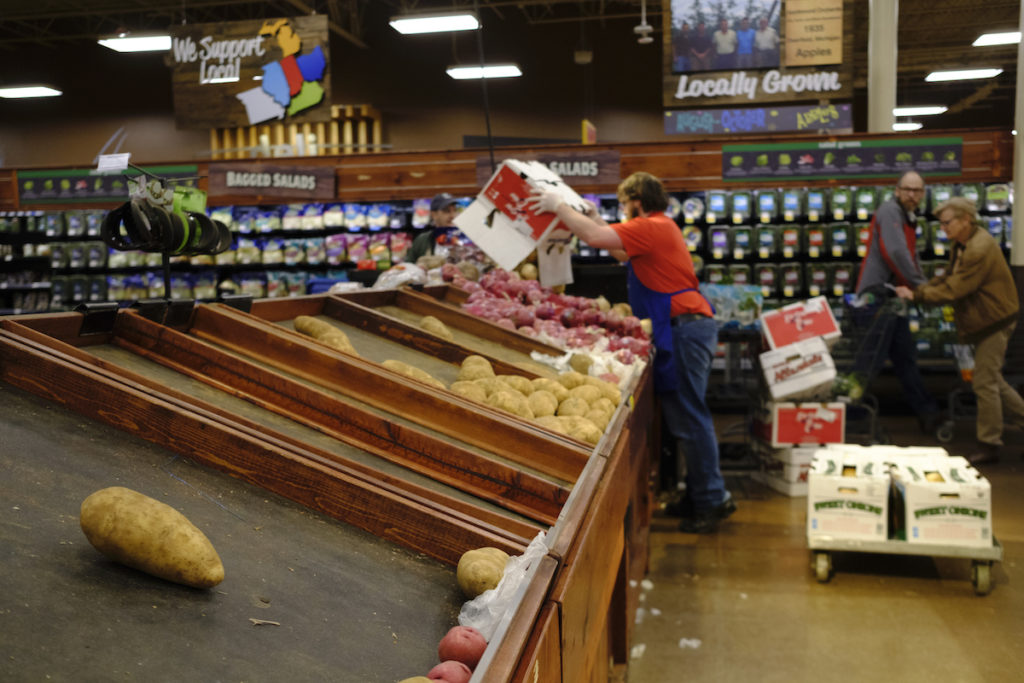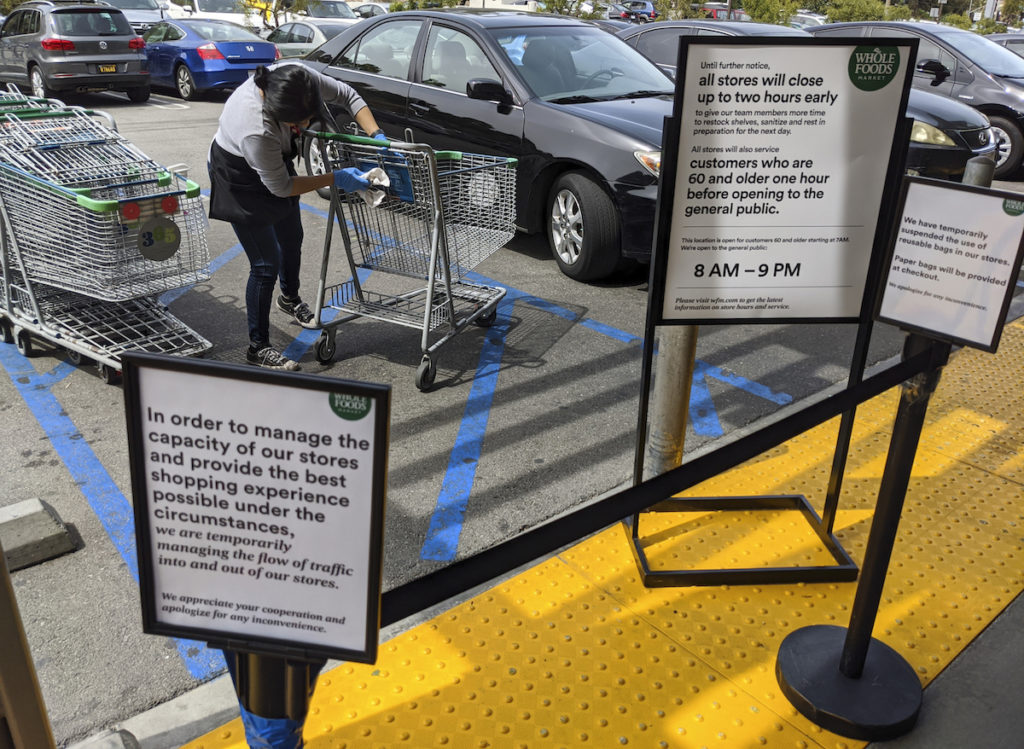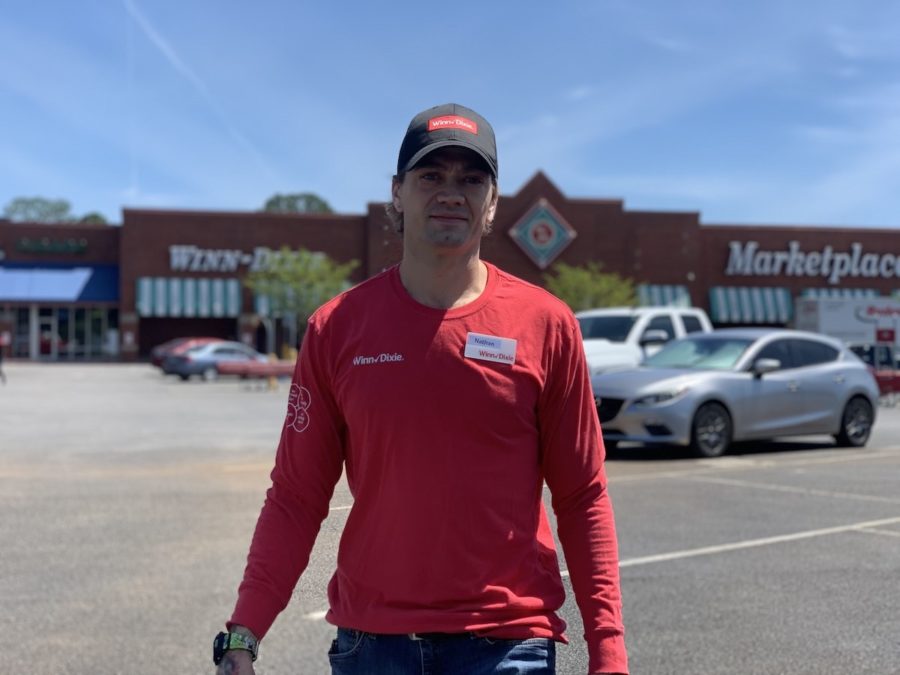By Will Carless and Patrick Michels / April 15, 2020
This story was originally published by Reveal from The Center for Investigative Reporting, a nonprofit news organization based in the San Francisco Bay Area. Learn more at revealnews.org and subscribe to the Reveal podcast, produced with PRX, at revealnews.org/podcast
Nathan Tetreault thought he was infected by the coronavirus, but he had to get back to work in the produce department of the Winn-Dixie supermarket in Pensacola, Florida.
In the three weeks he was off work sick, he wasn’t paid a penny.
“I feel like my lungs are very heavy,” Tetreault, 38, said in an interview earlier this month. “My wife’s having pretty much the same symptoms as I am. We feel like we’ve got those little lead blankets from the dentist’s just sitting on our lungs.”
Tetreault hasn’t been able to get tested for the virus. He’s not in a high-risk group, and while his symptoms were crippling, sending him to bed for much of the day, neither he nor his wife had a high fever, a key prerequisite to getting access to a COVID-19 test in Alabama, where Tetreault lives, just across the state line from Pensacola.
Tetreault’s wife, Rebecca, gets a disability check for $3,000 a month from the Department of Veterans Affairs. Rent and bills are $2,600. Without Nathan’s paycheck, the family has been down to $400 for everything else: medicine, doctor’s visits, clothing and, of course, groceries. Their family includes two growing teenagers, who eat a lot.
“You’ve gotta get creative with it,” he said. “You spend $14 on a whole turkey, boil it down, and it’ll last you close to a week if you eat every little bit of it.”
Because, according to Tetreault, he typically worked around 35 hours a week, he wasn’t eligible for Winn-Dixie’s medical benefits or paid time off. He wanted to work more, he said, but he believes the company kept him as a part-time employee so it wouldn’t have to pay him benefits.
As Tetreault sees it, the pandemic is putting capitalism on trial, and the financial reality of workers such as grocery clerks is a damning piece of evidence. “This is supposed to be the richest and greatest country in the world,” he said. “Right now, I really don’t feel that way.”
As Tetreault started to recover in early April, he found himself in limbo. He was planning to go back to work, even as he was still coughing and short on energy, but he said his manager asked for a doctor’s note before starting again. When he eventually got a note, he went back for only a week before quitting in frustration over the lack of worker protections at the store. There was no enforcement of social distancing, he said, and seven people were crammed into a break room with two tables to share. Next week, he’s starting a new job in the warehouse of a local hardware supplier.
Winn-Dixie’s parent company, Southeastern Grocers, which employs approximately 45,000 workers across 500 stores in the South, has announced new hours and safety measures but hasn’t announced additional paid time off for sick workers such as Tetreault or other financial help for the workers on the front lines. Company officials didn’t respond to calls and emails for comment about Tetreault’s situation and company policies during the coronavirus pandemic.
As the pandemic began to unfold, Reveal from The Center for Investigative Reporting reached out on social media to grocery store employees across the country to find out whether they feel safe at work and what their companies are doing to protect them. More than 600 responded. With dozens of U.S. grocery workers now dead from COVID-19, Reveal has found that major chains were slow to enact measures that could have protected these front-line employees.
Scores of workers said store managers at some of the largest grocery stores in the country – including Kroger, Walmart and Whole Foods Market – implemented policies that effectively incentivize sick and at-risk workers to report for duty or lose their jobs. Some, such as Tetreault, said they were left facing financial straits for doing the responsible thing: not coming into work sick.
Grocery store policies have been changing frequently as the virus spreads unevenly across the country. Survey responses and interviews with dozens of workers showed confusion across major chains, with some stores quick to react and change policies, while others dragged their feet. The responses also reflected inconsistent policies within the same chain, particularly regarding whether workers could wear gloves and masks on the job. The failures, some workers said, were a matter of life or death. Yet the scattershot policies indicate a lack of clear directives from the top.
“It’s a matter of time before we start dying,” wrote one Kroger employee in Nashville, Tennessee. Days later, reports began to surface across the country of grocery workers dying from the coronavirus, with at least 41 deaths reported as of Sunday. Two were employees at the same Walmart in suburban Chicago; the family of one of them, Wando Evans, filed a wrongful death lawsuit against the company for failing to warn Evans about other employees who had symptoms of COVID-19 and for not enforcing social distancing or providing protective gear. These claims echo complaints that Walmart employees made to Reveal prior to Evans’ death.
In survey responses received during the last week in March, nearly a dozen Walmart workers and more than two dozen Kroger workers from Savannah, Georgia, to Cincinnati said they and their co-workers were under pressure from store managers to report to work sick. Workers at both chains are among those who have died.
Dozens of workers – employees of several of the nation’s major grocery chains, including Kroger, Walmart and Albertsons – said they were discouraged from wearing gloves or masks or none were provided. Eleven Publix employees in Florida, North Carolina and Georgia said store managers forbade them from wearing protective gear at work. A Publix employee in North Carolina said: “We have been instructed to not wear gloves or masks in case we ‘incite panic’ on the floor. There is disciplinary action if we refuse to remove them.”
We’ve been telling stories that change laws and lives for more than 40 years. And we’re just getting started.
Sign up for our newsletter.
From mid-March to early April, the nation’s largest retailers began installing plexiglass sneeze guards at checkout stations as an additional precaution – but some cashiers doubt they do much good. Two Albertsons workers in California and three Publix employees in Florida and Virginia complained that the guards were too small or were in the wrong position to block respiratory droplets.
One of the workers’ most common complaints wasn’t about their employers, however. It was about customers, who employees said often crowded them while they worked, berated them when an item wasn’t in stock or wandered through stores in large groups.
The pandemic has thrust grocery store executives and store managers into an unlikely role as guardians of public health, forcing them to adapt on the fly at a time when advice from government leaders has been muddled, muted or inconsistent. As the crisis has deepened, the nation’s largest chains have announced greater protections, such as limiting the number of customers allowed in stores and providing personal protective equipment, and more generous compensation.
Kroger, for example, which announced that same-store sales rose 30% in March, initially offered employees a one-time credit of $25 to their in-store loyalty cards to compensate for new on-the-job hazards. Workers decried the bonuses as measly, and Kroger, which employs 435,000 full- and part-time staff, upped the payment to $150 for part-time and $300 for full-time workers. Walmart offered its associates a similar one-time lump sum.
In mid-March, Whole Foods and Albertsons, where more than half the workforce is unionized, raised employee pay by $2 an hour. Kroger followed suit, offering a $2-an-hour bump in pay for workers for three weeks starting March 29, under an agreement negotiated with the United Food and Commercial Workers International Union.
The company called the extra a “hero bonus.”
Trader Joe’s also announced last month that, thanks to booming sales, employees will be getting bonuses based on how many hours they have worked during the pandemic. A company spokesperson told Bloomberg Businessweek that the bonuses amount to about $2 an hour.
Reveal asked each of the nation’s 10 largest grocery retailers – Walmart Inc., The Kroger Co., Albertsons Cos. Inc., Ahold Delhaize USA, Publix Super Markets Inc., H-E-B, Meijer Inc., Wakefern Food Corp., Aldi Inc. and Whole Foods Market – to respond to the concerns their employees raised. Some responded with press releases detailing their latest policies, but only Kroger agreed to an interview.
“Frankly, all of us as citizens are in the middle of an incredibly rapidly evolving, ever-changing crisis,” said Keith Dailey, group vice president of corporate affairs for Kroger. “In every decision that we make, we strive to balance our most urgent priority – which is to provide a safe environment for our associates and customers – with meeting our societal obligation, which is to maintain open stores and e-commerce operations and an efficient supply chain so that customers have access to fresh food and the essentials they need.”
On March 22, according to a Stop & Shop spokesperson, the chain implemented a 10% pay increase for union employees. Giant Food spokesperson Daniel Wolk said his chain had done the same, from March 22 through May 2. Both brands are owned by Ahold Delhaize. “We recognize that our associates are doing extraordinary work to serve our communities during the COVID-19 pandemic,” Wolk wrote in an email.
Sales at large chains are booming, which workers said gives employers an opportunity – and a mandate – to properly care for them.
Most of the grocery workers requested anonymity for fear of retaliation. But not Tetreault.
“I don’t care anymore,” he said a week before he gave notice. “I’m at the point where I am just so fed up with it that I’m just done. It’s time for people to just start speaking out about their employers and the lack of care that we’re given.”
As the pandemic began, some chains – Whole Foods, Kroger and Walmart – quickly offered paid sick leave, with a catch: Workers had to test positive for COVID-19 to claim it. But with tests in short supply, grocery workers said they have found it nearly impossible to claim the benefit. On March 21, Whole Foods and Kroger changed their policies, saying workers could be eligible for paid leave without a positive COVID-19 test on a case-by-case basis.
One Whole Foods employee in Chicago said he believed he was sick with the coronavirus, but didn’t get tested because he’d heard tests were being rationed for people with severe symptoms. After Whole Foods relaxed its policy to allow sick employees to take paid time off without testing positive, he said he submitted a request for paid leave, but after a week, he still hadn’t heard back.
“I had been planning to go back to work in a few days because I was out of money,” he said. “I didn’t want to go back to work, but I didn’t really see an alternative.”
Facing a persistent lack of masks, gloves, sanitizer and even hot water for hand washing, and ineffective attempts at crowd control, many grocery workers expressed terror at the prospect of going to work each day.


Low wages and little paid leave
Before the coronavirus outbreak began, many at the largest grocers worked for near minimum wage, without health insurance. Whole Foods workers earned at least $15 an hour and accrued paid leave. But compensation packages at other companies were more bare bones. Walmart paid a minimum of $11 an hour, with paid leave. A Kroger spokesperson said its average hourly wage is $15 an hour, but many employees make less, according to union contracts published online. Courtesy clerks, who bag groceries, start at $8 an hour in Dallas and $8.50 in Atlanta. At Meijer, a Michigan-based chain that is among the nation’s largest grocery retailers, many employees said they do not get paid sick leave. Pay and sick leave at Meijer can vary depending on local union contracts, and the company did not respond to questions about its policies.
These weren’t wages that allowed grocery workers to accumulate substantial savings. So, they explained, their dread over potentially catching the virus during a shift – some said they feel it’s a certainty – still couldn’t compete with the prospect of financial hardship if they stayed home.
Kroger, Walmart and other large retailers offer health insurance to employees working above a minimum number of hours – another reason workers felt pressure to keep their jobs. A grocery bagger at one Meijer store near Grand Rapids, Michigan, said he believed his job was on the line if he stayed home.
“There were a string of multiple days where I was insanely sick yet came in to work to risk not being fired,” he told Reveal. “If you call in so many times in a row, no matter the reason, you can and will be terminated, so I would often have to basically ‘game the system’ and come in, despite clearly being in no shape to work.”
Many workers said they felt it was inevitable that they, and their family members, would get sick.
“I value my life as does my child. I need for you and Kroger to show me y’all value our lives,” wrote Monica Baez, a Kroger worker in Georgia who said she witnessed colleagues working sick. “I don’t wanna die or get sick just to serve the community by working at this time.”
‘Work without a mask or go home’
Gabriel Scurry has watched the coronavirus spread across California with trepidation. A manager at a Ralphs supermarket in Gardena, 25-year-old Scurry has been fearful of catching the virus at work and bringing it home to his wife, who is pregnant, and his 4-year-old daughter.
So in late March, Scurry showed up at work wearing a mask he bought last year when he was painting his house.
“My assistant store manager told me that I couldn’t wear it – that I needed to take it off because I couldn’t smile at the customers and I’d create panic for no reason,” Scurry said. “So I was forced to actually take it off.”
Ralphs is owned by Kroger, which also owns Dillons in the Midwest, Smith’s Food and Drug and King Soopers in Rocky Mountain states, Fry’s Food Stores in Arizona and Harris Teeter in the South Atlantic, among others. In responses to Reveal’s survey, dozens of Kroger employees, plus lesser numbers from other chains, said they initially were told not to wear masks, or even gloves, for fear of scaring customers.
“I was told to my face, ‘You can either work without a mask or go home,’ ” a Publix employee in Florida wrote.
As the pandemic worsened, chains relaxed, then abandoned these policies altogether, workers said. Employees at Publix and elsewhere said they are now allowed to wear whatever personal protective equipment they feel they need and can supply themselves. It wasn’t until early April that the federal government recommended that all people wear masks in situations where social distancing is difficult.
Publix spokesperson Maria Brous wrote in an email that the company has followed guidelines from the Centers for Disease Control and Prevention regarding protective equipment for workers.
“Although not required, Publix is able to provide masks and gloves for associates, while inventory is available,” Brous wrote. “Inventory is already scarce, and we anticipate it to become even more limited in the very near future as existing supplies continue to be reserved for healthcare and medical professionals.” She did not respond to a query about employees’ claims that they previously had been sent home for wearing masks.
Other grocery workers expressed concern over the risk of crowding.
“We don’t limit customers in our store,” a Walmart employee from Georgia wrote March 29, when the state already had 2,600 reported cases. “There are hundreds in there at times. How do you keep a 6 ft rule with that amount of people?”
Only on April 4 did Walmart adopt a chainwide policy limiting the number of customers allowed in stores at one time.
Common-sense measures to protect workers and shoppers, such as extra cleaning and the provision of ample hand sanitizer and hand-washing stations for employees, aren’t consistently in place, workers said.
“It being so busy no one had time to clean,” one Kroger worker from Lansing, Michigan, wrote. “Stockers would try and clean as much as possible but again we would have huge deliveries and have to get the product out so cleaning would get set aside.”
Hand sanitizer, so short in supply on supermarket shelves, has been equally hard to come by for grocery workers themselves. Told to wash their hands regularly with hot, soapy water, employees told us that their hand-washing stations often lacked soap or dispensed only cold water.
‘They have the capacity to provide these protections’
These weeks of quarantine stockpiling have been particularly good for Whole Foods’ parent company, Amazon; the company is hiring 175,000 new workers to meet the new “surge in demand.” But workers argued that Whole Foods hasn’t done enough to pass on that revenue surge to its employees. It has temporarily raised employees’ pay by $2 an hour and expanded paid time off, subject to a shifting set of conditions.
In an email to employees in early March, Whole Foods CEO John Mackey announced that workers would have unlimited unpaid time off for the month of March and reminded them that they could donate any paid sick time they’d accumulated to fellow co-workers during the outbreak. Although Mackey was widely criticized for the suggestion at a time when the company is enjoying brisk sales, many workers followed his advice.
Dave English, a performance artist and puppeteer who also works at a meat counter at a Pittsburgh Whole Foods, has been one beneficiary of this program. English has asthma, which puts him at greater risk of serious illness if he is exposed to the coronavirus. But English said his manager told him that even his doctor’s note urging him to self-quarantine wouldn’t fulfill the company’s criteria for coronavirus-related paid leave.
After taking a week off to avoid crowds in his store, he said he returned to work one day in late March and felt panic set in immediately. Then a manager took him aside and told him that he and supervisors had donated their paid leave so that he could stay home.


Under one of the laws Congress passed last month to respond to the pandemic, some businesses receiving federal aid are required to offer – and were provided tax credits to cover – more generous leave policies, including two weeks’ paid leave for employees to self-quarantine, seek preventative care or receive COVID-19 treatment; partially paid leave to care for family members; and 12 weeks’ unpaid leave with job protections. But small businesses with fewer than 50 employees are exempt, and large businesses with 500 or more employees aren’t covered because they aren’t eligible for the associated federal aid.
Yet many public officials now say large grocery retailers ought to match these benefits. Massachusetts Attorney General Maura Healey is leading a coalition of state attorneys general who have called on Whole Foods and Amazon to provide leave to their workers that matches the requirements in the new law.
Healey told Reveal that Amazon, whose CEO Jeff Bezos is one of the richest people on earth, can afford to extend these same benefits.
“If we’re requiring that of smaller businesses – businesses that employ less than 500 people – we sure should be requiring that from our big corporations like Amazon and Whole Foods, which have great business right now,” she said. “They have the capacity to provide these protections.”
“We need these workers in the store,” she added, “but we also don’t want sick workers in the store. And that’s why these leave policies are absolutely imperative.”
While many Whole Foods workers said they were frustrated by the company’s inadequate leave policies, others said its precautions, including access to gloves and floor markers to space out customers in line, made them feel safer.
“They are leading with compassion and we truly feel like a family,” said a Whole Foods worker from Maryland. “Our store is very committed to doing the best they and we can to stay safe and healthy during this time,” said a Nashville, Tennessee, employee.
“Whole Foods has done alot to keep us safe,” wrote an employee from Salt Lake City. “They are taking all the CDC recommendations and put them in place immediately. More readily available sanitizer, disinfectant wipes, register sneeze guards, to name a few. There is so much more they have done. What it really comes down to though is the uncertainty of this virus. Being on the frontlines we are pretty much just waiting day by day to get it.”
Cussed at, threatened and spat on
On top of the fear of exposure to the virus, grocery workers said they’re also facing anger, hostility and poor social distancing from many customers. Customers enter the aisles fearful of getting exposed and are upset and confused about the lack of products on the shelves. Grocery store workers bear the brunt of this frustration.
“I have witnessed and been targeted with death threats because we didn’t have items the customer wanted,” wrote a worker at a Kroger store in Columbus, Ohio. “I have been hit, and I have seen and heard employees be called some of the most vile names in the book.”
“Customers have been so out of line to the point where I feel scared to come to work for fear of being hit,” wrote an employee of a Kroger’s King Soopers store in Centennial, Colorado. “I have already been cussed out by a few so it can only be a matter of time. I shouldn’t have to feel this way considering I’m 17.”
The CDC’s 6-foot social distancing rule has by now become ubiquitous across the country. But many grocery workers derided the rule as a weak joke, given the sheer numbers of people cramming into their stores, largely ignored by customers and practically impossible to enforce.
A worker wrote that her Walmart in Las Vegas had become a de facto town square for people who are otherwise on lockdown. Despite an order from Nevada’s governor to stay at home, families have come in and spent hours drifting around the store in close proximity to workers and other customers alike, the employee wrote.
“Sure the strip is closed but people come to just hang out at Walmart,” the employee wrote. “Everyone seems to go about their day as if it were just another day.”
When it’s done right
At the Trader Joe’s in Escondido, California, an orderly line snakes across the parking lot. Shoppers wait patiently, 6 feet or more apart. As they step to the entrance of the store, a designated worker explains the rules – no more than 50 people in the store at any one time (a number that drops to 30 if there are fewer employees working a shift). Upon entering, each person is handed a wipe to clean the handle of their cart, and a greeter squirts hand sanitizer into their hands. Upon exiting the store, there’s another employee distributing hand sanitizer. Meanwhile, carts are sprayed down with disinfectant after each use.
These are the sorts of actions that workers at other chains told Reveal that they wanted to see at their stores. But so far, they haven’t even been consistently applied at all Trader Joe’s locations: Workers at some stores have said they don’t have access to the safeguards they need. In March, a company official told employees that “Trader Joe’s official policy on gloves is that we don’t have a policy. We never have,” according to The New York Times.
Store policies are still evolving. In late March, Kroger announced it would allow workers to wear masks. On March 31, Walmart announced it would begin supplying workers with masks and gloves and checking temperatures to prevent sick people from clocking in. Whole Foods announced it would check employees’ temperatures a few days later.
Yet many workers told Reveal that even when managers posted new policies – such as limits on the number of customers or mandatory distance between people in lines – they often failed to enforce them.
“With the chaos of the increased store traffic and of the constant changes in policy regarding the coronavirus, any policy they try to put into place has no real effectiveness,” wrote a worker for the Midwestern retailer Hy-Vee in Kansas. “Most of the time, it’s like the left hand doesn’t know what the right hand is doing.”
Other workers said national corporate policies were often a bad fit for their store.
In Baltimore, a Whole Foods worker said the quota on customers is still too many for their small store. “Our location is small and crowding is inevitable,” the worker wrote. “We allow only 50 in the store at a time, but that does not include Amazon shoppers or employees, so the store remains crowded.”
Whole Foods had just completed a much larger store nearby to relieve the crowding – but that opening has been delayed because of the coronavirus.
“This whole thing has also taken a toll on my mental health,” the Baltimore worker wrote. “I’m scared of spreading this to my roommates, one of whom has been recently hospitalized for lung issues. I come home and immediately shower and wash my clothes. I feel like a walking vector.”
This story was edited by Andrew Donohue and Esther Kaplan and copy edited by Nikki Frick.
Will Carless can be reached at wcarless@revealnews.org, and Patrick Michels can be reached at pmichels@revealnews.org. Follow them on twitter: @willcarless and @patrickmichels.










